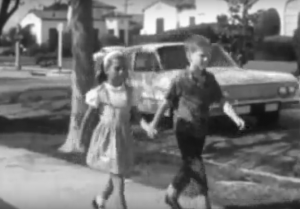Children Are Ready for Independence Much Younger Than They're Legally Allowed It, Study Finds
It’s almost as if our culture has willed American kids to be incompetent on their own, then used laws to reinforce that conclusion.
NEW YORK, NY, USA , April 25, 2023/EINPresswire.com/ -- At what age should the law prevent kids from doing things on their own, like walking to school, playing outside, or even waiting in the car?
A comprehensive research survey in The Social Policy Report finds that America’s child supervision and endangerment laws — the laws that dictate when kids can be unsupervised — are all over the map. Literally. Worse, they have almost nothing to do with children’s actual developmental capabilities.
In some states, like Connecticut, the law says children should never be alone before age 12. But in Minnesota, the age is 7. And in Kansas, it’s 6 – half as old as Connecticut!
Such a wide span indicates our country’s child neglect laws aren’t based on objective standards rooted in child development. In fact, there is a often a complete mismatch between the laws’ assumptions about children's abilities and what developmental science shows they can do.
For instance, American parents have been arrested or investigated for things like letting their kids walk to get a donut at ages 7 and 9, walk the dog at age 8, or babysit at age 14. These cases have little to do with child capabilities or real danger and almost everything to do with cultural expectations.
The paper’s authors – psychology professors Rachel Flynn and Nicholas Shaman, and civil rights lawyer Diane Redleaf – know that, “What age can my kids be unsupervised?” has no single answer. But they found that developmental science researchers have come to some conclusions about the age kids can generally handle some time on their own, provided the culture allows and encourages their competence.
What age is that?
Children’s roles and responsibilities undergo a qualitative shift around age 5-7, the authors note. In many communities around the world, 5-year-olds take care of their younger siblings. By age 7 or 8 they are contributing meaningfully to their family’s economic well-being.
The authors break down the components of child development and found that most kids have all the physical, cognitive, and social-emotional skills they need for them to, say, walk to school on their own by age 6 or 7.
Physically, of course, they have the ability to walk, bike, or wheel themselves around.
Cognitively, kids can understand what a map represents by age 4 or 5, and by 10 they can create mental maps at nearly adult levels.
The social-emotional skills that kids need to be “school-ready,” including impulse-control and responsible decision-making, are also in place by age 5. That means kids are also socially and emotionally ready at that age for the walk to school.
The big caveat is that these skills don’t simply kick in at age X. They develop through interactions, instruction, practice, and play.
If no one teaches a child to cross the street safely, they might not look both ways. Likewise, a child needs to be taught how to seek help if they need it. Most of all, they need practice interacting with other people, in a variety of situations.
That’s where play comes in. Play is so improvisational, it teaches kids to pay attention and react in real time, as well as how to get along with people. The more kids play, explore, and try things on their own, the more competent their brains and bodies become.
“As children walk to school independently, they are using their decision-making, problem-solving, responsibility, and independence skills,” the authors write. “These skills would not be practiced if an accompanying parent took charge.”
On the flip side – when parents keep taking charge -- “There is emerging research showing a relationship between a lack of independence and…anxiety and depression.
Five states have passed “Reasonable Childhood Independence” laws in the last few years saying that “neglect” is when you put your child in obvious, serious danger – not any time you take your eyes off them.
But too many states still treat children as helpless babies long after they’re developmentally ready for some independence. Even the legislators who are “pro” childhood-independence, but want to impose a high age limit on it, are doing child development no favors. They may be doing more harm than good.
Most of America’s so-called child protection laws fail to recognize the enormous benefits of independence -- and the pitfalls of treating children as less capable than they could be. By age 5, 6, 7 – or 12 – they are developmentally ready for far more than our culture, and laws, let them do.
That is not protecting children. That’s stifling them.
Rachel M. Flynn, PhD is an Assistant Professor of Child and Adolescent Development at San Francisco State University.
Nicholas J. Shaman, PhD is an Assistant Professor of Psychology the University of Houston – Clear Lake.
Diane L. Redleaf is an attorney and advocate for policies and practices that protect all families whose lives are impacted by the child welfare system. She is the author of They Took the Kids Last Night: How the Child Protection System Puts Families at Risk (ABC-Clio 2018) and Legal Consultant to Let Grow.
Diane Redleaf, Let Grow legal consultant
Let Grow
+1 708-927-8169
email us here
Visit us on social media:
Facebook
Twitter
YouTube
Legal Disclaimer:
EIN Presswire provides this news content "as is" without warranty of any kind. We do not accept any responsibility or liability for the accuracy, content, images, videos, licenses, completeness, legality, or reliability of the information contained in this article. If you have any complaints or copyright issues related to this article, kindly contact the author above.


